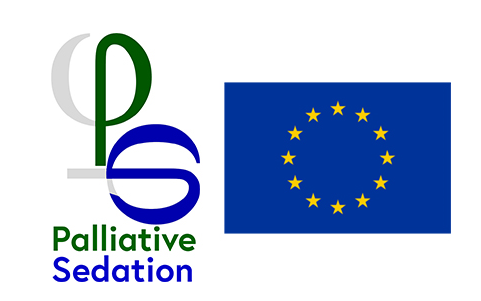Project ID
825700 (H2020-SC1-BHC-2018-2020)
Project title
The use of proportional palliative sedation for the relief of refractory symptoms: an international multicenter study — ‘PalliativeSedation’
Project manager, contact details
Jankovics Réka, jankovics.reka@pte.hu
Academic supervisor, contact details
Dr. Csikós Ágnes, csikos.agnes@pte.hu
Total project budget
4.033.520 EUR
Total budget of UP
279.250 EUR
Project start date
Project end date
Coordinator
ÁOK

Lead Partner
Stichting Katholieke Universiteit (NL)
Partner Organisations
Universidad de Navarra (ES), Katholieke Universiteit Leuven (BE), Hospice Casa Sperantei (RO), Universitaetsklinikum Bonn (DE), Lancaster University (UK), European Association of Palliative Care (BE), La Maddalena S.p.a. (IT), European Cancer Patient Coalition, (BE), Pécsi Tudományegyetem (HU)
General description
A daganatos és a multimorbid krónikus betegségek növekedése miatt növekedni fog a refrakter tünetekkel rendelkező betegek száma, akiknél a hagyományos tüneti kezelések hatástalanok. Ilyen esetekben használatos palliatív szedáció (PS): gyógyszerek ellenőrzött alkalmazásával a tudat éberségi szintjének csökkentése az elviselhetetlen szenvedés enyhítése érdekében.
A projekt fő céljai:
1) Az arányos PS gyakorlatának vizsgálata (klinikai vizsgálat, esettanulmányok);
2) PS etikai vonatkozásainak vizsgálata a ’moral case deliberation’ módszerével;
3) Az Európai Palliatív Társaság (EAPC) 2009-es ajánlásainak felülvizsgálata;
4) Ismeretterjesztés szakmai körökben (online oktatási program; szakpolitikai ajánlások; e-könyv a jógyakorlatokról, betegek számára készült összefoglalóval; kongresszus / webinar a szakemberek számára).
Program
Application monitoring
News reference
Project ID
825700 (H2020-SC1-BHC-2018-2020)
Project title
The use of proportional palliative sedation for the relief of refractory symptoms: an international multicenter study — ‘PalliativeSedation’
Project manager, contact details
Réka Jankovics, jankovics.reka@pte.hu
Academic supervisor, contact details
Ágnes Csikós, Dr. , csikos.agnes@pte.hu
Total project budget
4.033.520 EUR
Total budget of UP
279.250 EUR
Project start date
Project end date
Coordinator
Medical School

Lead Partner
Stichting Katholieke Universiteit (NL)
Partner Organisations
Universidad de Navarra (ES), Katholieke Universiteit Leuven (BE), Hospice Casa Sperantei (RO), Universitaetsklinikum Bonn (DE), Lancaster University (UK), European Association of Palliative Care (BE), La Maddalena S.p.a. (IT), European Cancer Patient Coalition, (BE), Pécsi Tudományegyetem (HU)
General description
Due to the rise in cancer and multiple chronic disease, the number of patients with refractory symptoms, ie severe symptoms where conventional treatment options fail, is likely to increase. In such cases palliative sedation (PS) can be indicated which involves the intentional lowering of consciousness at the end of life. However PS is too often restricted to continuous deep sedation and confused with hastening of death. This proposal offers a modified concept, namely proportional PS, with titration of sedatives up to the point of symptom control to improve patient comfort. Firstly, the project will offer a review about state-of-the-art refractory symptom management and a country survey. Secondly, an observational multicenter study will be performed in five countries to study the effect of proportional PS at patient comfort and symptom relief. Thirdly, a multiple case study of 50 cases will investigate caregivers and family experiences. Fourthly, moral case deliberation will be studied as a tool to improve multidisciplinary decision making for the treatment of refractory symptoms/PS in 16 clinical centers in 8 countries, including the effect on caregiver emotional distress. Fifthly, a Cost Consequence Analysis will be provided to feed a policy workshop and recommendations for the further development of palliative sedation in Europe. Sixthly, a revision of the 2009 EAPC framework for PS will be undertaken, using a Delphi procedure. Finally, a free online education programme will be delivered together with an abook and a closing congress and webinar to support dissemination. The project consortium consists of experts in the field of palliative care and PS from 8 North-Western, Southern, and Central-Eastern European countries. Renowned advisory board members are involved among which the European Cancer Patient Coalition to foster the patient perspective. A dedicated European taksforce for PS is foreseen as a follow up after the project's finalization.
Program
Application monitoring
News reference

